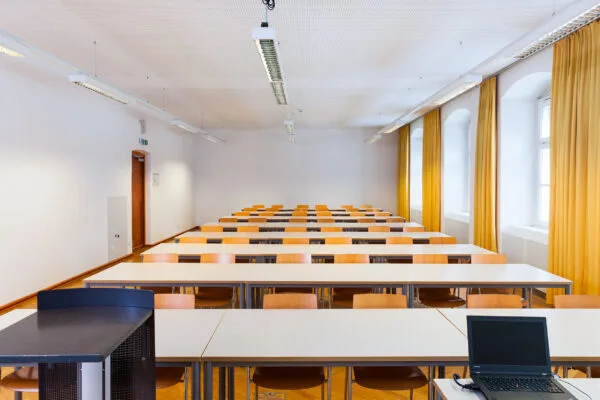
NAME:
Theologie – SR VI
BUILDING:
Theologie
FLOOR:
1
TYPE:
Seminar Room
CAPACITY:
48
ACCESS:
Only Participants
EQUIPMENT:
Beamer, PC, WLAN (Eduroam), Overhead, Flipchart, Blackboard, Handicapped Accessible, LAN, Speaker Desk
The TranStat project focuses on transitions in mountain areas, particularly those linked to the winter sports economy. It aims to better characterise the transition processes underway in these areas, examining the environmental, economic and social issues at stake. The project involves a network of 9 mountain resorts, considered as Living Labs, located in 5 countries of the Alpine region, including the French resort of Saint Pierre de Chartreuse.
In this resort, as part of the territorial analysis carried out by the TranStat team, and more specifically the social analysis, a study was carried out among the permanent residents, via semi-directive interviews and the administration of a survey which received 330 responses, i.e. almost half of the adult inhabitants of the municipality.
The survey highlighted the existence of different profiles of residents in terms of their geographical origins and residential pathways. The study explored the socio-demographic characteristics of these different groups, their identity-based attachments to the territory at different scales, their attitudes regarding climate change, and their relationships with the ski resort, tourism and local life and its evolution. This work has highlighted the significant social and cultural changes taking place in the area, as well as the unifying elements and points of divergence among different profiles of inhabitants. It also reveals the link between a strong attachment to the area and the ski resort, and concerns about the future and ongoing changes—concerns that extend beyond the mere issue of losing the resort. By situating these analyses within the broader transition process currently affecting the mountain resort and the territory, we aim to explore how these elements contribute to reflections on the notion of ‘Living Well’ in the territory. We will present the main findings of this survey and examine their implications for social cohesion, community life, and the territory’s ability to foster shared visions of the future to drive transformative change.

We and use cookies and other tracking technologies to improve your experience on our website. We may store and/or access information on a device and process personal data, such as your IP address and browsing data, for personalised advertising and content, advertising and content measurement, audience research and services development. Additionally, we may utilize precise geolocation data and identification through device scanning.
Please note that your consent will be valid across all our subdomains. You can change or withdraw your consent at any time by clicking the “Consent Preferences” button at the bottom of your screen. We respect your choices and are committed to providing you with a transparent and secure browsing experience.
Notifications